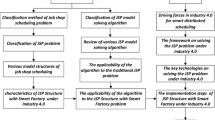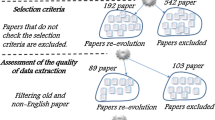Abstract
Due to the restrictions that most traditional scheduling strategies only cared about users’ quality of service (QoS) time or cost requirements, lacked the effective analysis of users’ real service demand and could not guarantee scheduling security, this paper added trust into workflow’s QoS target and proposed a novel customizable cloud workflow scheduling model. In order to better analyze different user’s service requirements and provide customizable services, the new model divided workflow scheduling into two stages: the macro multi-workflow scheduling as the unit of cloud user and the micro single workflow scheduling. It introduced trust mechanism into multi-workflow scheduling level. And in single workflow scheduling level, it classified workflows into time-sensitive, cost-sensitive and balance three types according to different workflow’s QoS demand parameters using fuzzy clustering method. Based on it, it customized different service strategies for different type. The simulation experiments show that the new schema has some advantages in shortening workflow’s final completion time, achieving relatively high execution success rate and user satisfaction compared to other kindred solutions.























Similar content being viewed by others
References
Liu, P.: Cloud Computing, 2nd edn. Publishing House of Electronics Industry, Beijing (2011)
Foster, I., Kesselman, C.: “The Grid: Blueprint for a New Computing Infrastructure”. Morgan Kaufmann, San Francisco (1999)
Chinese Cloud Computing Forum. http://bbs.chinacloud.cn
Vouk, M.A.: Cloud computing-issues research and implementations, Proceedings ITI 2008 30th International Conference on Information Technology Interfaces, 2008. IEEE, (2008)
Zhu, F., He, Y.: Parallel Scheduling Algorithm in Distributed Computing Theory and Design. Wuhang University Press, Wuhang (2003)
Ullman, J.D.: Complexity of sequencing problems. In: Coffman, E.G. (ed.) Computer and Job Scheuling Theory. Wiley, New York (1976)
Li, X., Gui, X.: Cognitive model of dynamic trust forecasting. J. Softw. 21(1), 163–176 (2010)
Li, X., Gui, X.: Research on dynamic trust model for large scale distributed environment. J. Softw. 18(6), 1510–1521 (2007)
Pan, J., Xu, F., Lv, J.: Reputation-based recommender discovery approach for service selection. J. Softw. 21(2), 388–400 (2010)
Hu, J., Wu, Q., Zhou, B., et al.: Robust feedback credibility-based distributed P2P trust model. J. Softw. 20(10), 2885–2898 (2009)
Wang, S., Zhang, L., Li, H.: Evaluation approach of subjective trust based on cloud model. J. Softw. 21(6), 1341–1352 (2010)
Hu, C., Chang, B., Xu, H., Zhao, Q.: Approach of service combination based on deepness trust reasoning in complex cross-organizational collaboration. J. Central South University (Science and Technology) 43(2), 567–575 (2012)
Wang, Y., Xiao, X., Jia, L.: Dynamic and comprehensive evaluation method for interoperability trust based on fuzzy variable weighting. J. Comput. Res. Dev. 49(6), 1235–1242 (2012)
Xie, X., Liu, L., Zhao, P.: Trust model based on double incentive and deception detection for cloud computing. J. Electron. Inform. Technol. 34(4), 812–817 (2012)
Wei, Z., Zhou, W., Ren, X., Wei, Q., et al.: A strategy-proof trust based decision mechanism for pervasive computing environments. Chin. J. Comput. 35(5), 871–882 (2012)
Liu, W., Yin, L., Fang, B., Zhang, H.: A hierarchical trust model for the internet of things. Chin. J. Comput. 35(5), 846–855 (2012)
Long, J., Liu, X., Yuan, X., Zhang, Z., et al.: A web services composition strategy based on trust reasoning and evolution. Chin. J. Comput. 35(2), 298–314 (2012)
Qi, x, Jiyi, W., Guilin, W., Wenhao, L., et al.: Provably secure authentication protocol based on convertible proxy signcryption in cloud computing. Sci. China 42(3), 303–313 (2012)
Jiyi, W., Ping, L., Pan, X., Zhuo, L.: Cloud computing: concept and platform. Telecommun. Sci. 33(3), 59–66 (2012)
Li, Wenjuan, Ping, L., Li, J., Qiu, Q.: Cloud service discovery algorithm based on trust fuzzy comprehensive evaluation. ICIC Express Lett. Part B 3(2), 1–6 (2012)
Li, W., Ping, L., Pan, X.: Trust model to enhance security and interoperability of cloud environment. In: Proceedings of the 1st International Conference on Cloud Computing (CloudCom’09), pp. 69–79. Springer, Berlin (2009)
Li, W., Ping, L., Qiu, Q., Zhang, Q.: Research on trust management strategies in cloud computing environment. J. Comput. Inform. Syst. 8(4), 1757–1763 (2012)
Zhao, G.: Research on adaptive genetic algorithm based service workflow scheduling problem. Sun yat-sen university, Guangzhou (2010)
Yu, J., Tian, G., Cao, Y., et al.: A resource allocating algorithm in reliability. J. Comput. Res. Dev. 46(2), 1821–1829 (2009)
Yuan, Y., Li, X., Wang, Q., et al.: Time optimization heuristics for scheduling budget\_constrained grid workflows. J. Comput. Res. Dev. 46(2), 194–201 (2009)
Li, J.: QoS Optimal, Grid Workflow Scheduling Algorithm. Guangxi University, Guilin (2009)
Wang, Y., Hu, C., Du, Z.: QoS-awared grid workflow schedule. J. Softw. 17(11), 2341–2351 (2006)
Azzedin, F., Maheswaran, M.: Integrating trust into grid resource management systems. Proceedings of the 2002 International Conference on Parallel Processing, pp. 47–54. Vancouver, British Columbia (2002)
He, X., Sun, X., Gregor, V.L.: QoS guided Min-rain heuristic for grid task scheduling. J. Comput. Sci. Technol. 18(4), 442–451 (2003)
Weng, C., Lu, X.: Heuristic scheduling for bag -of-tasks applications in combination with QoS in the computational grid. Future Gener. Comput. Syst. 21(2), 271–280 (2005)
Buyya, R., Abramson, D., Giddy, J., et al.: Economic models for resource management and scheduling in grid computing. J. Concurr. Comput. 14(13–15), 1507–1542 (2002)
Hum, P.M., Thompson, M.R.: Security implications of typical grid computing usage scenario, pp. 95–103. Proceedings of the IEEE HPDC, San Francisco, CA (2001)
Li K., He Y., Liu X.: Security-driven scheduling algorithms based on eigentrust in grid. In: Proceedings of the 6th International Conference of Parallel and Distributed Computing Applications and Technologies, Denver, USA, pp. 1068–1072 (2005)
Zhang, W., Fang, B., et al.: A trust-QoS enhanced grid service scheduling. chin. J. Comput. 29(7), 1157–1166 (2006)
Yuan, L., Zeng, G., et al.: Dynamic level scheduling based on trust model in grid computing. Chin. J. Comput. 29(7), 1217–1224 (2006)
Hu, Z., Juan, H.: Grid workflow scheduling algorithm under constraints of trust. Appl. Res. Comput. 27(8), 2936–2938 (2010)
Hu, C., Wu, M., Liu, G.: QoS scheduling based on trust relationship in web service workflow. Chin. J. Comput. 32(1), 42–53 (2009)
Hu, C., Wu, M., Liu, G., et al.: An approach to constructing web service workflow based on business spanning graph. J. Softw. 18(8), 1870–1882 (2007)
Han, J.: Research on grid workflow scheduling algorithm under the constraints of trust. Zhongnan University, Changsha (2010)
Wang, X.: On the policy description and quantification model for trust management. National University of Defense Technology, Changsha (2009)
Li, W., Zhang, Q., Ping, L., Pan, X.: Cloud scheduling algorithm based on fuzzy clustering. J. Commun. 33(3), 146–154 (2012)
Li, W., Pan, X., Zhang, Q., Ping, L.: A novel job scheduling model to enhance efficiency and overall user fairness of cloud computing environment. In: Proceedings of the 1st International Conference on Cloud Computing and Services Science (CLOSER2011), pp. 152–157. SCITePress, Noordwijkerhout (2011)
Bezdek, J.C.: Pattern Recognition with Fuzzy Objective Function Algorithms. Plenum Press, New York (1981)
NetLogo home page. http://ccl.northwestern.edu/netlogo
Calheiros, R. N., Ranjan1, R., De Rose, C. A. F., and Buyya, R.: “CloudSim: a novel framework for modeling and simulation of cloud computing infrastructures and services”. http://www.chinacloud.cn/show.aspx?id=1316&cid=28
Buyya, R., Ranjan, R., and Calheiros, R.N.: “Modeling and simulation of scalable cloud computing environments and the CloudSim toolkit: challenges and opportunities”. In: Proceedings of the 7th High Performance Computing and Simulation Conference (HPCS09), IEEE Computer Society, June 2009
Chung, J.Y., Shih, W.K., Jane, W.S., et al.: Scheduling periods jobs that allow imprecise results. IEEE Trans. Comput. 39(9), 1156–1174 (1990)
Yu, A.C., Lin, K.J.: Scheduling parallelizable imprecise computations on multiprocessor. In: Proceedings of the 5th International Symposium on Parallel Processing. Anaheim, CA, USA, pp. 531–536 April 30–May 2 1991
Zhang, W., Liu, X., Yun, X., Zhang, H., et al.: Trust-driven job scheduling heuristics for computing grid. J. Commun. 27(2), 73–79 (2006)
Zhao, C.: Research and Realization of Job Scheduling Algorithm in Cloud Environment. Beijing Jiaotong University, Beijing (2009)
Acknowledgments
This work is supported by the Natural Science Foundation Research Project of Zhejiang Province (LQ12G02016). The authors also gratefully acknowledge the helpful comments and suggestions of the reviewers.
Author information
Authors and Affiliations
Corresponding author
Rights and permissions
About this article
Cite this article
Li, W., Wu, J., Zhang, Q. et al. Trust-driven and QoS demand clustering analysis based cloud workflow scheduling strategies. Cluster Comput 17, 1013–1030 (2014). https://doi.org/10.1007/s10586-013-0340-1
Published:
Issue Date:
DOI: https://doi.org/10.1007/s10586-013-0340-1




